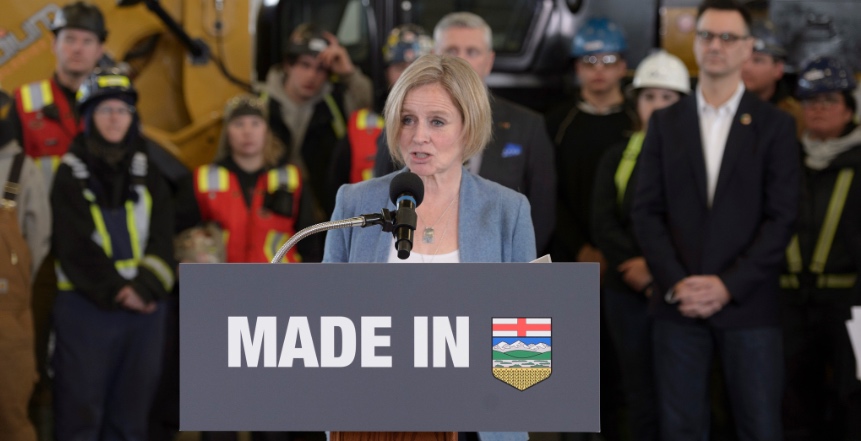In the end, the “Alberta Advantage” was dependence.
And in retrospect, undoing that dependence on the oil industry — a mixture of real and perceived — needed to be the number one priority of the Notley NDP government. When Albertans (even to their own surprise) overthrew the 40-year Progressive Conservative dynasty in 2015, they were hungry for change, and they knew that change was both inevitable and urgent, given the realities of global climate change — something they had been increasingly experiencing (most notably when the third “one-in-a-hundred-year flood” in 10 years ate High River and downtown Calgary).
Instead, industry managed to keep the focus on oil development and pipelines, and sucked all of the rest of the political and economic air out of the room.
Of course, Alberta’s energy sector is well-versed in fostering and using the dependence on its jobs and products — whether manipulating gas prices, making punitive and excessive layoffs whenever an administration or policy it doesn’t like is in place, or dangling illusionary carrots, like job creation estimates that factor in a hundredfold of jobs that they imagine might be generated by their project (and which nobody ever follows up on to debunk). In reality, building a pipeline creates merely a small number of regionally-shifting jobs aimed at transporting the longer-term refining jobs out-of-country, but nobody really ever remarks on that, because of how overwhelmed with industry propaganda Albertans are, and their eagerness for what little crumbs industry is willing to toss their way.
Now, the rest of Canada might not be overly sympathetic to Alberta’s plight, right now, because the province has had a pretty good run, riding waves of oil prices over the past few decades to sustained prosperity, while labour markets elsewhere have dwindled, automated, and relocated to other countries. Consequently, Alberta may feel the coming change more acutely than the rest of Canada — but feel it everyone will.
Change is hard. It’s disruptive. And with the level of budgetary dependence on energy royalties and the perceived dependence (thanks to the hard work of neoliberal institutions like the Fraser Institute, CAPP and corporate media) of everyone’s jobs on oil development, Alberta has had four years of reckoning that haven’t really done anything to assuage any of the associated fears that come with that change.
To be fair, that transition was never something that was going to be able to take place in a scant four years.
Additionally, the Notley NDP have tried to break some of that sense of dependence through diversification. It’s something that hasn’t been well-publicized, but it also needed to be more aggressively pursued. And diversification is only one step — job retraining and the economic support and optimism needed to get through it are more critical. Albertans looked to Rachel Notley to lead them into and through a transition, and somewhere along the way, industry convinced the government and the public alike that the transition was yet another pipeline.
Consequently, we find ourselves at a crossroads in which Albertans seem receptive to old, failed conservative policies of austerity and corporate giveaways, regardless of the ethical concerns with a guy who may have broken electoral laws in order to become party leader, and regardless of whether he has surrounded himself with lake-of-fire social conservatives and semi-open white nationalists. It’s why we’ve seen people who’ve never protested before come out to agitate for pipelines, and naively allowed themselves to get hijacked by and aligned with racist wingnuts who’d previously floundered on the fringe for decades. Despite the stereotype of the Albertan redneck, Albertans have always tended toward worrying about the money, and not caring about the social positions that have aligned themselves with it (which is, in a way, even worse).
But here’s the clincher: a pipeline isn’t going to slow or stop the one-in-a-hundred-year floods, or the summer seasons that might soon be renamed “Smoke,” or the fracking-triggered earthquakes. And electing a traditional oil crony is more likely to undo the first steps that Alberta has taken than to make those hard choices. Because the longer Alberta tries to forestall its transition, the more abrupt, disruptive, and devastating that eventual change is going to be.
Mercedes Allen is a graphic designer and advocate for transsexual and transgender communities in Alberta. She writes on equality, human rights, LGBT and sexual minority issues in Canada, and the cross-border pollination of far-right spin. This post also appears on Dented Blue Mercedes.
Photo: Chris Schwarz/Government of Alberta/Flickr
Help make rabble sustainable. Please consider supporting our work with a monthly donation. Support rabble.ca today for as little as $1 per month!




